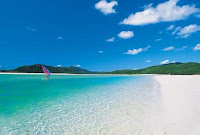
Some nationalities are eligible to apply for an Australian Tourist Visa electronically with an ‘Electronic Travel Authority Visa’ (ETA).
Here's the list of eligible countries. However, some nationalities are not able to apply for an ETA. That means that they must generally apply for either a ‘sponsored family visitor visa’ (subclass 679) or a ‘tourist visa’ (subclass 676).
A sponsored family visitor visa (subclass 679) is usually for applicants who have an eligible ‘Australian citizen’ or ‘permanent resident’ sponsor. While a tourist visa (subclass 676) is for those who don’t have an eligible sponsor.
In both cases the applicant must satisfy the Department of Immigration and Citizenship (DIAC) that, amongst other things:
• a genuine visit is intended; and
• they have their own, or access to, adequate funds to support themselves.
Establishing a Genuine VisitDIAC must be satisfied that the applicant’s intention is to visit Australia as a genuine visitor only, that is, that they:
• will not work;
• will not study more than 3 months; and
• will depart Australia before their visa expires.
In deciding whether a visa applicant intends a genuine visit some of the relevant considerations that DIAC will take into account are:• The personal circumstances that may encourage the applicant to return to their home country, including: on-going employment; the presence of immediate family in their home country; and property or other significant assets owned in their home country.
• Personal circumstances or other conditions in the applicants home country, that may encourage the applicant to remain in Australia, including: the applicants economic situation; the applicants personal ties to Australia, that is, does the applicant have more close family members living in Australia than in their home country; military service commitments; civil disruption, including war, lawlessness or political upheaval in the applicant’s home country; and economic disruption, including shortage, famine, or high levels of unemployment, or natural disasters in the applicant’s home country.
• The applicant’s prior immigration history, including but not limited to: previous overseas travel. Has the applicant travelled outside his or her own country or geographic region? If “yes”, where did they travel, how often, and did they comply with the immigration laws of the other country?
• Previous visa applications for Australia. If the applicant has travelled to Australia previously, did they comply with the conditions of their visa? Did they work without permission, apply to remain in Australia or fail to depart Australia within the period of stay authorised by their visa?
• The credibility of the applicant in terms of character and conduct, that is, whether there is any evidence that false or misleading information and/or documentation has been presented in relation to this or any other visa application.

Adequate fundsIn respect of the adequate funds criterion an applicant must satisfy DIAC that they have funds of their own, or access to adequate funds, to cover the period of stay sought and the activities proposed.
If an applicant indicates they will be meeting their own expenses during the proposed visit and the DIAC has doubts about the applicant’s ability to do this, then evidence may be sought. This evidence may include, but is not limited to, bank passbooks and/or statements. Generally, cash and travellers cheques are not acceptable evidence of funds unless it can be proven that the applicant owns the funds.
Applicants who indicate that they will be relying on the assistance of another person during the proposed visit should indicate the level of assistance being offered. Generally, the person offering support should confirm their offer in writing and this should accompany the visa application. In some cases, the other person may also be required to supply evidence that they have the ability to provide the level of support offered.
For an ETA tourist visa to Australia, that is: * only AUD $17 (one of the cheapest prices on the internet!) * 100% safe and secure * available 24/7 * hastle-free and simple to obtainWhy not check out our online visa service?This is a general overview only and it is not intended to be individual advice. As with all visa applications there are other requirements that have to be satisfied. Please contact www.bridgemigration.com for professional, migration advice.

























